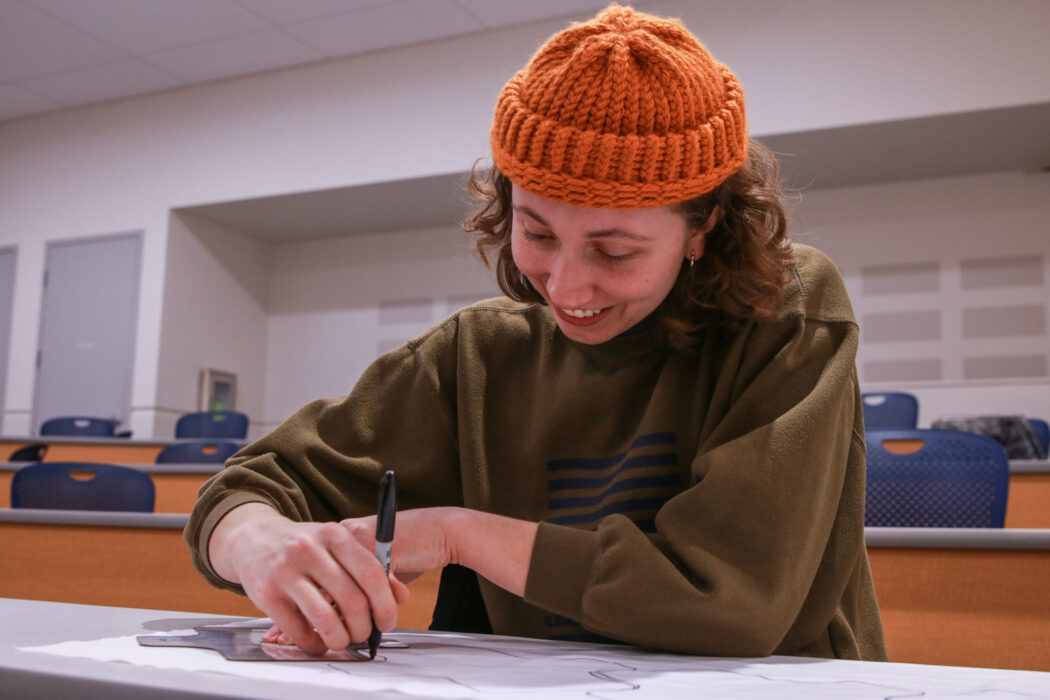Days for Girls creating menstrual equity
According to a 2022 study from the Women’s Reproductive Health Journal, nearly 12 million menstruating women in America lack access to menstrual products. A 2022 national survey from BMC Women’s Health found 14.2% of those unable to afford items like pads or tampons were university students. Days for Girls is an organization working to bridge this gap and end period poverty for women around the world.
Days for Girls provides sustainable menstrual products, hygiene kits and reproductive health education in over 100 countries. The organization has 17 chapters in Utah, with a local chapter operating out of Utah State University.
Third-year public health student Emily Gibbons has been involved with the chapter for three years. They meet every Wednesday at 7 p.m. in Room 226 in Huntsman Hall, where members help make menstrual health kits.
“What we primarily do is we cut out PUL, which is a lining that goes into the shield for the pads,” Gibbons said. “Then we add snaps to the cloth.”
PUL, or polyurethane laminate, is a breathable, flexible, machine washable and waterproof fabric. Members put together reusable pads which are then shipped to another chapter who sews them together.
“The kits have two shields and three to five pads plus an underwear,” Gibbons said. “Those pads are able to be washed after every use and they last for about five to eight years.”
Kits can also contain different hygiene products, such as soap and a washcloth. Local chapters put together the kits to be shipped to areas most in need.
“We send the kits to a drop point in Salt Lake and then they get sent all over the world,” Gibbons said. “A lot got sent to Ukraine when the war started happening, and then a lot got sent to South America and Africa.”
According to Gibbons, reproductive health education is a broader focus of Days for Girls, while local chapters are geared towards making kits.
“We’ve done a little bit of education in the club itself, just about what we do in menstrual care and helped in period drives,” Gibbons said. “Most of the education is done on an international level.”
For Gibbons, Days for Girls represents an opportunity to get involved with service.
“It’s the perfect way to give back,” Gibbons said. “It’s something that I’ve been so blessed with that I’ve never had to worry about my period or where I’m getting my menstrual products from next.”
According to a study by the University of Michigan, one in five girls will miss or stop attending school altogether due to barriers in accessing menstrual products. Those who lack appropriate products may overuse items like rags or towels, which can increase the risk for genital infections.
“I’ve never had issues with period poverty, and because of that I’ve been able to go to school and have my career and education,” Gibbons said. “But places where girls have to miss school because of period poverty, they’ve stopped going, which really puts a hinder on their improvement through life.”
At the global level, Days for Girls advocates for supportive policies and menstrual health research. Maryland’s chapter helped establish free menstrual supplies in prisons, shelters and schools and was the first state to do so statewide in 2017.
The organization partnered with Cambodia’s Ministry of Education to develop a menstrual health education program in 2019 for students grades 5-12.
In 2020, the organization launched the South African Coalition for Menstrual Health Management alongside the United Nations Population Fund, South Africa Department of Women and WaterAid. The coalition coordinates research efforts and resources for better menstrual health management in South Africa.
“Getting to come and work with all these amazing girls here and being able to share this mutual experience of having periods then being able to give back to others has been my favorite experience,” Gibbons said.
Ben Teames is a fourth-year student studying outdoor product design and development. Teames has been with the chapter for three years.
“I had friends that were in the club that were like, ‘Come make reusable period products,’” Teames said. “I’m all about reusable products.”
Destigmatizing menstruation is a core component of Days for Girl’s mission. According to research from the University of Leeds, a culture of shame has surrounded periods throughout history, with menstruation regarded as dirty or embarrassing.
“The organization does really good work with going into communities and educating people,” Teames said. “They’re educating not just women but especially men in other communities just to remove some of the preconceived notions about menstruation.”
Teames said cliches about white savior work in other countries don’t capture the full picture of the organization, because the organization works towards breaking menstrual stigma in local communities as well.
While education is not the primary focus, it has become a byproduct of the physical work the chapter does each week to end period poverty. Teames hopes initiatives like Days for Girls at USU continues to create discussion and inspire change.
“I wish stuff like this was talked about more,” Teames said. “I just don’t think a lot of people know that there is a conversation going on, even at this level of university.”
According to Teames, USU’s chapter is a part of breaking down the cultural stigma surrounding menstruation and sexual health in Logan.
“I think change is hard to implement at a bureaucratic scale just because we are a state university,” Teames said. “But I think the fact that we have non-gendered bathrooms and that both sides have free menstrual health products is really cool.”
The chance to meet with like-minded people and work towards a cause is one of Teames’s favorite parts of being in the chapter.
“This is my one day a week where I know I’m going to be social with people doing something that is actually worthwhile,” Teames said.

